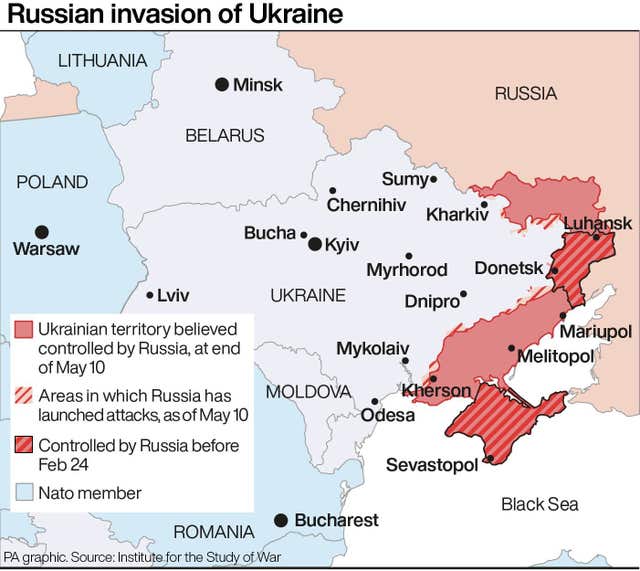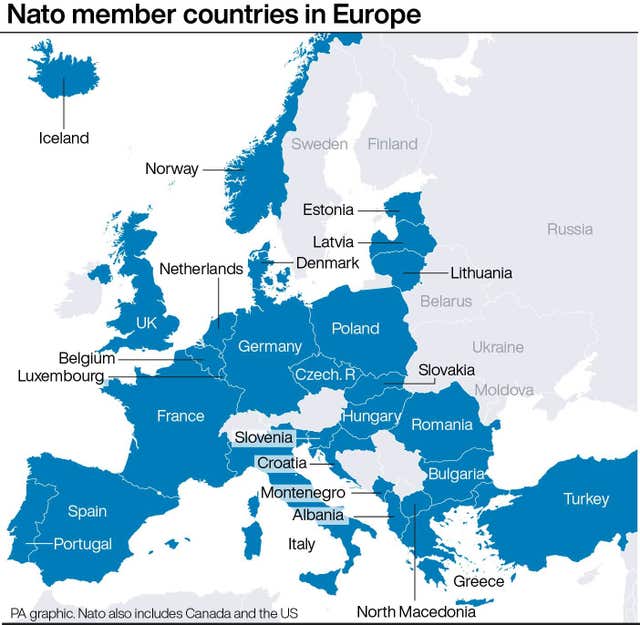The trial of a Russian soldier accused of killing a Ukrainian civilian has opened, marking the first war crimes case since Moscow’s invasion of its neighbour.
Scores of journalists packed inside a small courtroom in the Ukrainian capital of Kyiv, where the suspect appeared in a small glass cage for the start of a trial that has drawn international attention amid accusations of repeated atrocities by Russian forces.
Sgt Vadim Shyshimarin, 21, is accused of shooting a 62-year-old Ukrainian man in the head in the north-east village of Chupakhivka.
He could get up to life in prison.
The killing occurred in the early days of the war, when Russian tanks advancing on Kyiv were unexpectedly overrun and retreated.
Shyshimarin, a member of a tank unit captured by Ukrainian forces, admitted shooting the civilian in a video posted by the Security Service of Ukraine.
“I was ordered to shoot,” he said of the killing on February 28.
“I shot one (round) at him. He falls. And we kept on going.”
Shyshimarin’s video statement is “one of the first confessions of the enemy invaders”, according to the Ukrainian security service.
The trial comes as Russia’s campaign to take Ukraine’s east slowly grinds on — but its invasion has resulted in widespread repercussions beyond the battlefield.
Two and a half months after Russia’s invasion of Ukraine sent a shiver of fear through Moscow’s neighbours, Finland’s President and prime minister announced Thursday that the Nordic country should apply right away for membership of Nato, the military defence pact founded in part to counter the Soviet Union.

“You (Russia) caused this. Look in the mirror,” said Finnish President Sauli Niinisto.
Finland’s Parliament still has to weigh in but the announcement means it is all but certain to apply — and gain admission.
The process could take months to complete.
Sweden, likewise, is considering putting itself under Nato’s protection.
That would represent a major change in Europe’s security landscape; Sweden has avoided military alliances for more than 200 years, while Finland adopted neutrality after its defeat by the Soviets in the Second World War.
The Kremlin warned it may take retaliatory “military-technical” steps.
Public opinion in both nations shifted dramatically in favour of Nato membership after the invasion, which stirred fears in countries along Russia’s flank that they could be next.
Latest Defence Intelligence update on the situation in Ukraine – 13 May 2022
Find out more about the UK government's response: https://t.co/7SVSQChAFe
🇺🇦 #StandWithUkraine 🇺🇦 pic.twitter.com/vqt5MS4LR5
— Ministry of Defence 🇬🇧 (@DefenceHQ) May 13, 2022
Such an expansion of the alliance would leave Russia surrounded by Nato countries in the Baltic Sea and the Arctic and would amount to a stinging setback for Russian President Vladimir Putin.
He had hoped to divide and roll back Nato in Europe but is instead seeing the opposite happen.
Nato secretary-general Jens Stoltenberg has said the alliance would welcome Finland and Sweden with open arms.
Turkish President Recep Tayyip Erdogan, though, says his country is ‘not favourable’ to Finland and Sweden joining Nato.
Nato’s funnelling of weapons and other military support to Ukraine has been critical to Kyiv’s surprising ability to stymie the invasion, and the Kremlin warned anew that the aid could lead to direct conflict between Nato and Russia.
“There is always a risk of such conflict turning into a full-scale nuclear war, a scenario that will be catastrophic for all,” said Dmitry Medvedev, deputy head of Russia’s security council.
On the ground, Britain’s Ministry of Defence (MoD) said on Friday that Russia has not made any significant advances despite concentrating forces in the Donbas after withdrawing troops from other areas.
British military officials said Russia lost “significant” elements of at least one battalion tactical group — about 1,000 troops — and equipment that were used to quickly deploy a makeshift floating bridge while trying to cross the Siverskyi Donets River west of Severodonetsk.

“Conducting river crossings in a contested environment is a highly risky manoeuvre and speaks to the pressure the Russian commanders are under to make progress in their operations in eastern Ukraine,” the MoD said in its daily intelligence update.
As the fighting and Russian strikes persisted, teachers were trying to restore some sense of normalcy after the war shut Ukraine’s schools and devastated the lives of millions of children.
In Kharkiv, Ukraine’s second-largest city, lessons are being given in a subway station used as a bomb shelter that has become home for many families.
“It helps to support them mentally. Because now there is a war, and many lost their homes … some people’s parents are fighting now,” said teacher Valeriy Leiko.
In part thanks to the lessons, he said, “they feel that someone loves them”.
Primary school-age children joined Mr Leiko around a table for history and art classes in the subway station, where children’s drawings now line the walls.
An older student, Anna Fedoryaka, was monitoring lectures on Ukrainian literature being given by Kharkiv professor Mykhailo Spodarets online from his basement.

Internet connections were a problem, Ms Fedoryaka said. And “it is hard to concentrate when you have to do your homework with explosions by your window”.
At least two civilians were killed on the outskirts of Kharkiv on Thursday, authorities said.
The attacks also damaged a building housing a humanitarian aid unit, municipal offices and hospital facilities, Vyacheslav Zadorenko, the mayor of the suburban town of Derhachi, wrote in a Telegram post.
None of the sites “had anything to do with military infrastructure”, Mr Zadorenko said.
The Ukrainian military chief for the eastern Luhansk region said on Friday that Russian forces opened fire 31 times on residential areas the day before, destroying dozens of homes, notably in Hirske and Popasnianska villages, and a bridge in Rubizhne.
Russia’s advance in the Donbas has been slow but its forces have gained some ground and taken some villages.
In other developments, Ukrainian officials said their forces took out another Russian ship in the Black Sea, though there was no confirmation from Russia and no casualties were reported.

The Vsevolod Bobrov logistics ship was badly damaged but not thought to have sunk when it was hit while trying to deliver an anti-aircraft system to Snake Island, said Oleksiy Arestovych, an adviser to the Ukrainian President Volodymyr Zelensky.
In April, the Ukrainian military sank the Moskva cruiser, the flagship of Russia’s Black Sea fleet.
In March, it destroyed the landing ship Saratov.
Ukraine said Russian forces fired artillery and grenade launchers at Ukrainian troops around Zaporizhzhia, which has been a refuge for civilians fleeing Mariupol, and attacked in the Chernihiv and Sumy regions to the north.
The Ukrainian military also said Russian forces were transferring additional artillery units to border areas near Chernihiv, where overnight strikes killed at least three people.
It said Russian troops fired rockets at a school and student dormitory in Novhorod-Siversky and that some other buildings, including private homes, were also damaged.
In his evening address to the nation, Mr Zelensky condemned the assaults.
Had a phone conversation with 🇸🇰 President @ZuzanaCaputova. Discussed 🇺🇦's progress in obtaining the status of a candidate country for EU membership. Supported the increase in sanctions. Discussed fuel imports from 🇸🇰. Thanked for the humanitarian & defense aid, invited her to 🇺🇦
— Володимир Зеленський (@ZelenskyyUa) May 12, 2022
“Of course, the Russian state is in such a state that any education only gets in its way,” he said.
“But what can be achieved by destroying Ukrainian schools? All Russian commanders who give such orders are simply sick and incurable.”
The southern port of Mariupol has largely been reduced to smoking rubble with little food, water or medicine, or what the mayor called a “medieval ghetto”.
Ukrainian fighters there continued to hold out at the Azovstal steel plant, the last stronghold of resistance in the city.
Ukrainian deputy prime minister Iryna Vereshchuk said negotiations were underway with Russia to win the release of 38 severely wounded Ukrainian defenders from the plant.
She said Ukraine hoped to exchange them for 38 “significant” Russian prisoners of war.




Comments: Our rules
We want our comments to be a lively and valuable part of our community - a place where readers can debate and engage with the most important local issues. The ability to comment on our stories is a privilege, not a right, however, and that privilege may be withdrawn if it is abused or misused.
Please report any comments that break our rules.
Read the rules here